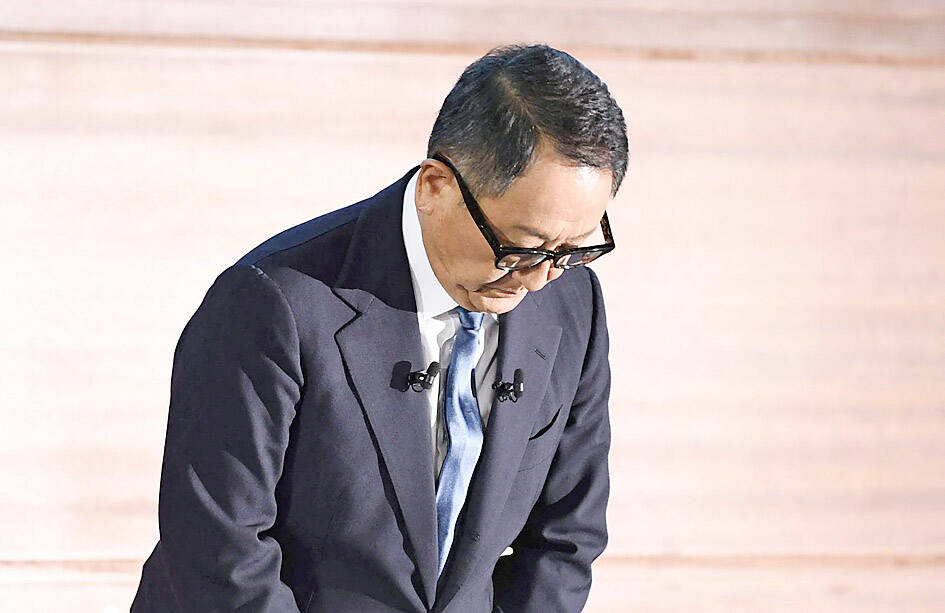Toyota Motor Corp chairman Akio Toyoda yesterday said he was “ashamed” of recent scandals involving subsidiaries of the Japanese auto giant, as the firm announced record vehicle sales of 11.2 million across its brands last year.
The bumper figure — an industry record — allowed Toyota to retain its position as the world’s top-selling automaker for the fourth successive year, thanks to a recovery in demand and easing chip shortages.
Taking only the Toyota and Lexus brands, global volume sales totaled 10.3 million units, but growth fell for Daihatsu Motor Co, which builds mini-vehicles and is embroiled in a rigged safety test scandal.

Photo: Kyodo via Reuters
Truck and bus maker Hino Motors Ltd, which has also been hit by a scandal related to rigged tests of its engines in Japan, saw volume sales sink almost 10 percent.
It came a day after Toyota said it was suspending shipments of 10 models that use diesel engines linked with testing irregularities at an affiliate, Toyota Industries Corp.
Toyoda bowed in apology at a press conference and said he was ultimately responsible for the misconduct.
“I deeply apologize for the repeated wrongdoings by Hino Motors, Daihatsu Motor and Toyota Industries that have caused troubles and worries to customers and stakeholders,” he told reporters.
“They lost sight of the values and priorities that should have been upheld,” he said, adding that he was “ashamed” of the situation.
“It will take time to recover the trust back from our customers,” Toyoda said, promising to lead a “transformation.”
Toyota’s total vehicle sales figure was a jump of 7.2 percent from a year earlier and compares with 9.2 million for Germany’s Volkswagen Group, whose unit sales soared 12 percent.
South Korea’s Hyundai-Kia Group retained third place last year with 7.3 million units sold, up 6.7 percent.
Toyota attributed its performance to “solid demand in each region, in addition to easing chip shortages in each region.”
However, in terms of market value, Elon Musk’s US electric vehicle (EV) maker Tesla Inc remained No. 1.
Toyota last year sold just 104,018 EVs — a fraction of the 1.81 million for Tesla and 1.57 million for China’s BYD Co (比亞迪).
The company has said that by next year it plans to have an electrified version for every Toyota and Lexus model globally, and aims to sell 1.5 million EVs annually by 2026 and 3.5 million by 2030.
Yesterday’s figure combined sales for the Toyota, Lexus, Daihatsu and Hino brands, and beat Toyota’s own previous record of 10.7 million set in 2019, the year before it overtook Volkswagen.
Volkswagen’s 2019 unit sales of 10.97 million was the previous industry record.

Jensen Huang (黃仁勳), founder and CEO of US-based artificial intelligence chip designer Nvidia Corp and Taiwan Semiconductor Manufacturing Co (TSMC, 台積電) on Friday celebrated the first Nvidia Blackwell wafer produced on US soil. Huang visited TSMC’s advanced wafer fab in the US state of Arizona and joined the Taiwanese chipmaker’s executives to witness the efforts to “build the infrastructure that powers the world’s AI factories, right here in America,” Nvidia said in a statement. At the event, Huang joined Y.L. Wang (王英郎), vice president of operations at TSMC, in signing their names on the Blackwell wafer to

AI BOOST: Although Taiwan’s reliance on Chinese rare earth elements is limited, it could face indirect impacts from supply issues and price volatility, an economist said DBS Bank Ltd (星展銀行) has sharply raised its forecast for Taiwan’s economic growth this year to 5.6 percent, citing stronger-than-expected exports and investment linked to artificial intelligence (AI), as it said that the current momentum could peak soon. The acceleration of the global AI race has fueled a surge in Taiwan’s AI-related capital spending and exports of information and communications technology (ICT) products, which have been key drivers of growth this year. “We have revised our GDP forecast for Taiwan upward to 5.6 percent from 4 percent, an upgrade that mainly reflects stronger-than-expected AI-related exports and investment in the third

RARE EARTHS: The call between the US Treasury Secretary and his Chinese counterpart came as Washington sought to rally G7 partners in response to China’s export controls China and the US on Saturday agreed to conduct another round of trade negotiations in the coming week, as the world’s two biggest economies seek to avoid another damaging tit-for-tat tariff battle. Beijing last week announced sweeping controls on the critical rare earths industry, prompting US President Donald Trump to threaten 100 percent tariffs on imports from China in retaliation. Trump had also threatened to cancel his expected meeting with Chinese President Xi Jinping (習近平) in South Korea later this month on the sidelines of the APEC summit. In the latest indication of efforts to resolve their dispute, Chinese state media reported that

CHINESE EXPORT CURBS: A dispute between China and the Netherlands could halt chip supply, affecting vehicle production, US and European auto associations said Groups representing major automakers late on Thursday warned that a chip disruption stemming from a dispute between China and the Dutch government could quickly affect US auto production. Automakers and their suppliers received notice from chipmaker Nexperia (安世半導體) last week that it could no longer guarantee delivery of its chips, the European Automobile Manufacturers Association said, adding that manufacturing could be significantly disrupted. In the US, the Alliance for Automotive Innovation, which represents General Motors, Toyota, Ford, Volkswagen, Hyundai and nearly all other major automakers, urged a quick resolution. “If the shipment of automotive chips doesn’t resume — quickly — it’s going to